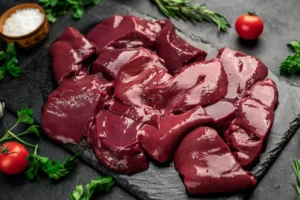Table of Contents
What is Beef Liver?

Beef Liver: A Nutrient-Dense Superfood for Optimal Health
Nutritional Profile of Beef Liver
A 3-ounce serving of braised beef liver (about 85 grams) contains:
- Calories: 162
- Protein: 24.7 g
- Vitamin B12: 2,500% DV
- Vitamin A: 891% DV
- Copper: 1,356% DV
- Iron: 31% DV
- Zinc: 41% DV
Beef liver is also rich in other B vitamins, selenium, phosphorus, and choline, making it one of the most nutrient-dense foods available.
Health Benefits of Beef Liver
1. Boosts Energy Levels
Beef liver is an excellent source of B vitamins and iron, which are essential for energy production. Vitamin B12, in particular, plays a critical role in converting food into energy. A 2023 study found that iron supplementation improved fatigue and mood in non-anemic athletes, highlighting the importance of iron for energy metabolism.
2. Supports Immune Function
The high levels of vitamin A, zinc, and B vitamins in beef liver contribute to a robust immune system. Zinc, often referred to as the “gatekeeper of immune function,” is vital for the proper functioning of immune cells, as noted in research published in the journal Nutrients.
3. Promotes Red Blood Cell Production
Iron and B vitamins in beef liver are crucial for the production of healthy red blood cells, preventing anemia. Vitamin B12 works synergistically with folate and iron to support this process.
4. Enhances Cognitive Function
Choline, found in beef liver, supports brain health and may improve memory, learning, and mood. A study on children with mild anemia showed that consuming liver-based supplements improved cognitive function, likely due to the high iron and vitamin A content.
5. Supports Fetal Development
Beef liver is rich in folate, which is essential for fetal development and helps prevent birth defects. However, pregnant women should monitor their vitamin A intake to avoid toxicity.
6. Detoxification and Liver Health
In Traditional Chinese Medicine, beef liver is used to support liver function and detoxification. It also provides CoQ10, which is associated with cardiovascular health and reduced inflammation.
Risks and Side Effects
While beef liver offers numerous health benefits, there are some potential risks to consider:
- Vitamin A Toxicity: Excessive intake of vitamin A can lead to toxicity. Moderation is key.
- High Cholesterol: Beef liver is high in cholesterol, so individuals with high cholesterol or heart disease should consume it in moderation.
- Foodborne Illness: Improper handling or undercooking can increase the risk of foodborne illnesses.
- Drug Interactions: Beef liver may interact with certain medications, so consult your doctor before adding it to your diet.
Who Should Avoid Beef Liver?
Certain individuals should avoid or limit their consumption of beef liver:
- Pregnant or Breastfeeding Women: High vitamin A levels can be harmful to the fetus or infant.
- Individuals with High Cholesterol: The high cholesterol content may exacerbate heart disease.
- People with Gout: The purine content in beef liver can worsen gout symptoms.
- Those Allergic to Beef or Organ Meats: Allergic reactions can occur in sensitive individuals.
How to Incorporate Beef Liver into Your Diet
If you’re new to beef liver, try these delicious recipes to make it more palatable:
1. Classic Liver and Onions
Sauté thinly sliced beef liver with onions, garlic, and herbs for a traditional dish that balances the liver’s strong flavor.
2. Beef Liver Pâté
Blend cooked beef liver with butter, herbs, and spices to create a creamy pâté. Serve with crackers or toast.
3. Sautéed Beef Liver with Peppers and Onions
Stir-fry beef liver with bell peppers, onions, and a splash of balsamic vinegar for a quick and flavorful meal.
4. Beef Liver Stew
Simmer beef liver with vegetables, broth, and spices for a hearty and nourishing stew.
Beef Liver Supplements
If you prefer not to eat beef liver directly, consider high-quality supplements. Look for brands that:
- Source beef liver from grass-fed, pasture-raised cows.
- Use freeze-dried liver to preserve nutrients.
- Provide transparency about ingredients and manufacturing processes.
Conclusion
Beef liver is a nutrient-dense superfood that offers a wide range of health benefits, from boosting energy and immune function to supporting cognitive health and fetal development. While it may not be for everyone, incorporating beef liver into your diet—whether through meals or supplements—can provide essential nutrients that are often lacking in modern diets. For more information on nutrient-rich foods, visit Healthline.